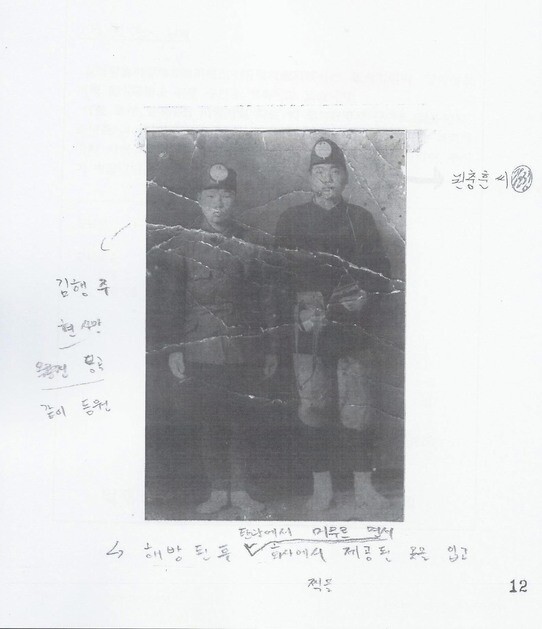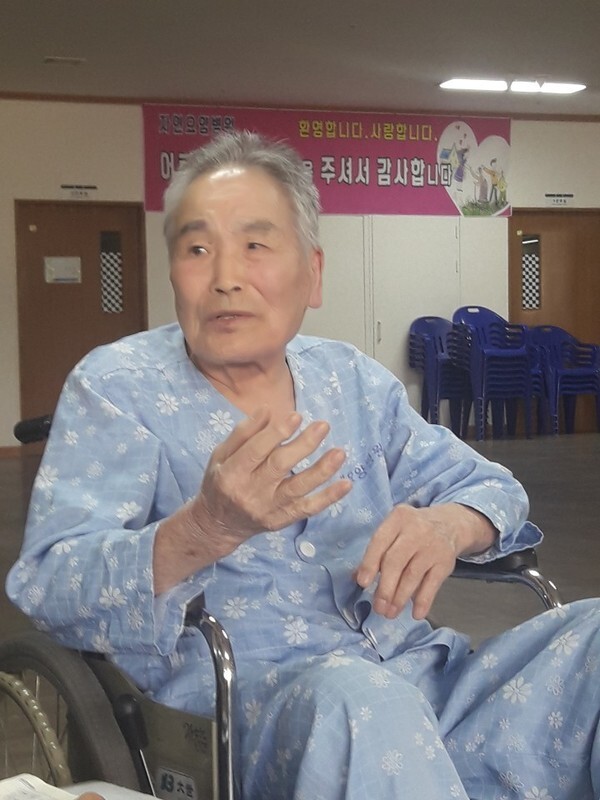hankyoreh
Links to other country sites 다른 나라 사이트 링크
Forced laborers file additional lawsuits against Japanese firms

“We were so hungry that we even stole and ate some of the fodder for the horses.”
During Japan’s colonial occupation of Korea, Kwon Chung-hun, 91, was forced to work at Akabira Mine in Hokkaido, which was operated by Sumitomo Coal Mining (today known as Sumiseki Holdings). Kwon, who had been living in Okryong Township, Gwanyang County, South Jeolla Province, was nabbed by an employee at the township office in October 1943. The 15-year-old boy was forced to work in atrocious conditions at the mine.
“It was so bad I tried to run away. When they caught me, they beat me half to death,” Kwon said.
Kwon’s misery is readily apparent in a black-and-white photograph in which he is wearing the work uniform provided by Akabira Mine. It wasn’t until November 1945, after the War in the Pacific had ended, that Kwon finally managed to board a ship at Hakata Harbor that would take him home.

Koreans who were forcibly mobilized during the colonial period and the family members of the deceased have sued Japanese companies for damages.
A civic group supporting former members of the Korean Women’s Volunteer Labor Corps and the Gwangju and South Jeolla Province branch of MINBYUN-Lawyers for a Democratic Society reported submitting the documents for a damages lawsuit filed by 54 victims of forcible mobilization to the Gwangju District Court on Apr. 29. Kwon is one of just three of the 54 forced laborers in the case who are still alive; the other 51 are represented by their surviving family members. The amount of compensation that the plaintiffs are requesting ranges from 5 million won to 100 million won (US$4,296-85,928). Nine companies are being sued for damages, including Mitsubishi Mining (currently Mitsubishi Materials, 19 plaintiffs), Mitsubishi Heavy Industry (12), Sumitomo Coal Mining (8), and Mitsui Mining (currently Nippon Coke and Engineering, 7).
The civic group is planning to file several more rounds of lawsuits. According to material provided by a government commission under the prime minister that provided aid to victims of forcible mobilization during the Japanese colonial period, 26,540 people were forcibly mobilized for labor from Gwangju and South Jeolla Province alone, but only 1,000 people are taking part in the damage lawsuits.
In October and November 2018, the South Korean Supreme Court ruled in favor of forced laborers and members of the Korean Women’s Volunteer Labor Corps during the Japanese colonial period who had sued Japanese companies for damages. While the Supreme Court ordered Nippon Steel and Mitsubishi Heavy Industries to pay restitution to the plaintiffs, the Japanese companies have not been carrying out that judgment.
By Jung Dae-ha, Gwangju correspondent
Please direct comments or questions to [english@hani.co.kr]

Editorial・opinion
![[Column] When ‘fairness’ means hate and violence [Column] When ‘fairness’ means hate and violence](https://flexible.img.hani.co.kr/flexible/normal/500/300/imgdb/original/2024/0516/7417158465908824.jpg) [Column] When ‘fairness’ means hate and violence
[Column] When ‘fairness’ means hate and violence![[Editorial] Yoon must stop abusing authority to shield himself from investigation [Editorial] Yoon must stop abusing authority to shield himself from investigation](https://flexible.img.hani.co.kr/flexible/normal/500/300/imgdb/original/2024/0516/4417158464854198.jpg) [Editorial] Yoon must stop abusing authority to shield himself from investigation
[Editorial] Yoon must stop abusing authority to shield himself from investigation- [Column] US troop withdrawal from Korea could be the Acheson Line all over
- [Column] How to win back readers who’ve turned to YouTube for news
- [Column] Welcome to the president’s pity party
- [Editorial] Korea must respond firmly to Japan’s attempt to usurp Line
- [Editorial] Transfers of prosecutors investigating Korea’s first lady send chilling message
- [Column] Will Seoul’s ties with Moscow really recover on their own?
- [Column] Samsung’s ‘lost decade’ and Lee Jae-yong’s mismatched chopsticks
- [Correspondent’s column] The real reason the US is worried about Chinese ‘overcapacity’
Most viewed articles
- 1China calls US tariffs ‘madness,’ warns of full-on trade conflict
- 2[Column] US troop withdrawal from Korea could be the Acheson Line all over
- 3[Editorial] Yoon must stop abusing authority to shield himself from investigation
- 4[Column] When ‘fairness’ means hate and violence
- 5[Column] How to win back readers who’ve turned to YouTube for news
- 6US has always pulled troops from Korea unilaterally — is Yoon prepared for it to happen again?
- 7[Book review] Who said Asians can’t make some good trouble?
- 8Naver’s union calls for action from government over possible Japanese buyout of Line
- 9Could Korea’s Naver lose control of Line to Japan?
- 10[Editorial] Korea must respond firmly to Japan’s attempt to usurp Line